How AI Will Revolutionize Everyday Life by 2030
Introduction
The AI revolution is no longer a distant aspiration but a rapidly unfolding reality that will transform every aspect of daily life by 2030. From healthcare and smart homes to transportation, personal assistants and the workplace artificial intelligence is transitioning from an innovative luxury to an essential part of everyday living.
This technological advancement will bring about unparalleled convenience enhanced safety and highly personalized experiences tailored to individual needs. As AI becomes deeply integrated into our routines it will redefine how we interact with our environment, manage tasks and make decisions. The widespread adoption of AI promises to improve quality of life, optimize efficiency and unlock new possibilities across multiple domains fundamentally reshaping society in the years to come.
Below we explore the top five domains where AI will reshape everyday experiences, interweaving recent real world examples and authoritative sources.
AI in Healthcare From Diagnosis to Personalized Medicine
By 2030 AI will underpin a new era of precision medicine enabling earlier disease detection and tailor made treatments.
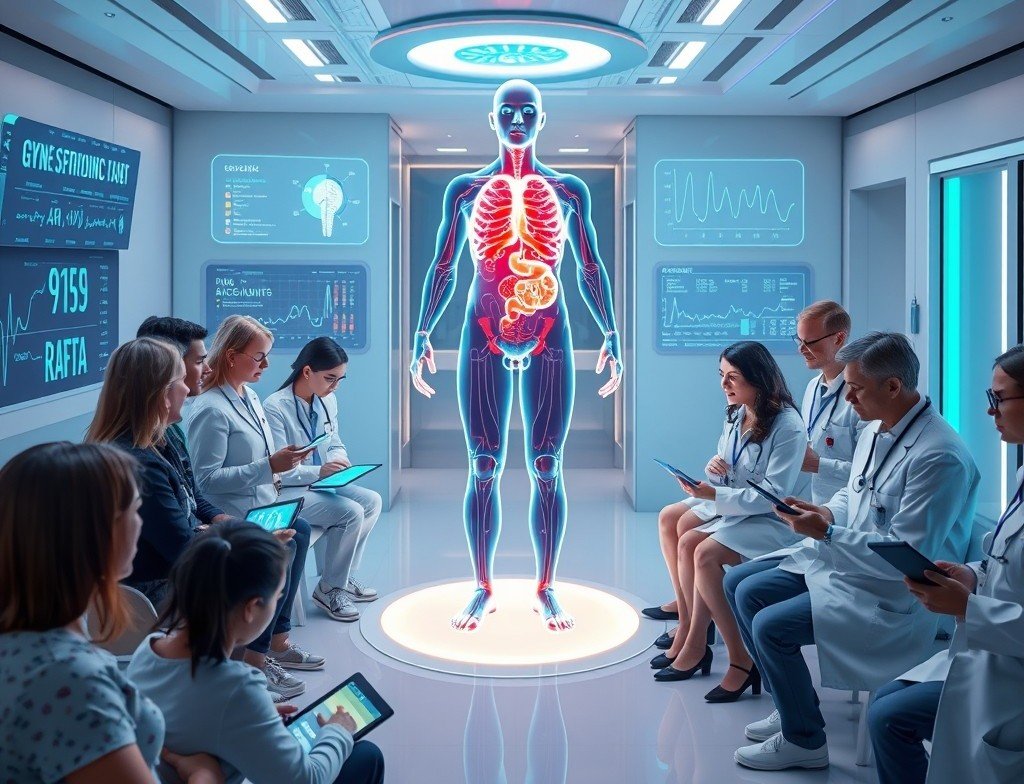
Early cancer detection algorithms such as Google Health’s deep learning model for mammograms demonstrated to reduce false negatives by 9.4% and false positives by 5.7% compared to expert radiologists are already FDA cleared and deployed in clinics across the U.S. (“Using AI to Detect Cancer at an Early Stage”). Wearable AI platforms like Wearable Devices’ LMM system endorsed by the U.S. Department of Health and Human Services now analyze bio signals in real time to flag cardiac anomalies before symptoms emerge (Wearable Devices Advances AI Health Monitoring Platform).
https://www.globenewswire.com/news-release/2025/06/25/3105062/0/en/Wearable-Devices-Advances-AI-Health-Monitoring-Platform-as-U-S-HHS-Embraces-Wearable-Tech.html
By 2030 AI driven robotic surgery will become standard in many hospitals. A 2025 meta analysis of 25 peer reviewed studies found AI assisted procedures reduce operative times by 25% intraoperative complications by 30% and patient recovery times by 15% while improving surgical precision by 40% (“The rise of robotics and AI assisted surgery in modern healthcare”).
https://pmc.ncbi.nlm.nih.gov/articles/PMC12181090/
Mental health diagnostics will also benefit from AI. Natural language processing models trained on millions of anonymized therapy transcripts can now identify depression or anxiety cues in speech with over 87% accuracy enabling earlier intervention through telehealth platforms.
Live Example:
Massachusetts General Hospital’s AI powered platform “CHIEF” interprets pathology slides across 19 cancer types with 94% accuracy assisting oncologists in prognosis and treatment selection (A New Artificial Intelligence Tool for Cancer)
https://hms.harvard.edu/news/new-artificial-intelligence-tool-cancer
Smart Homes Powered by AI
Homes of 2030 will function as intelligent ecosystems anticipating needs and optimizing resources with minimal human input.
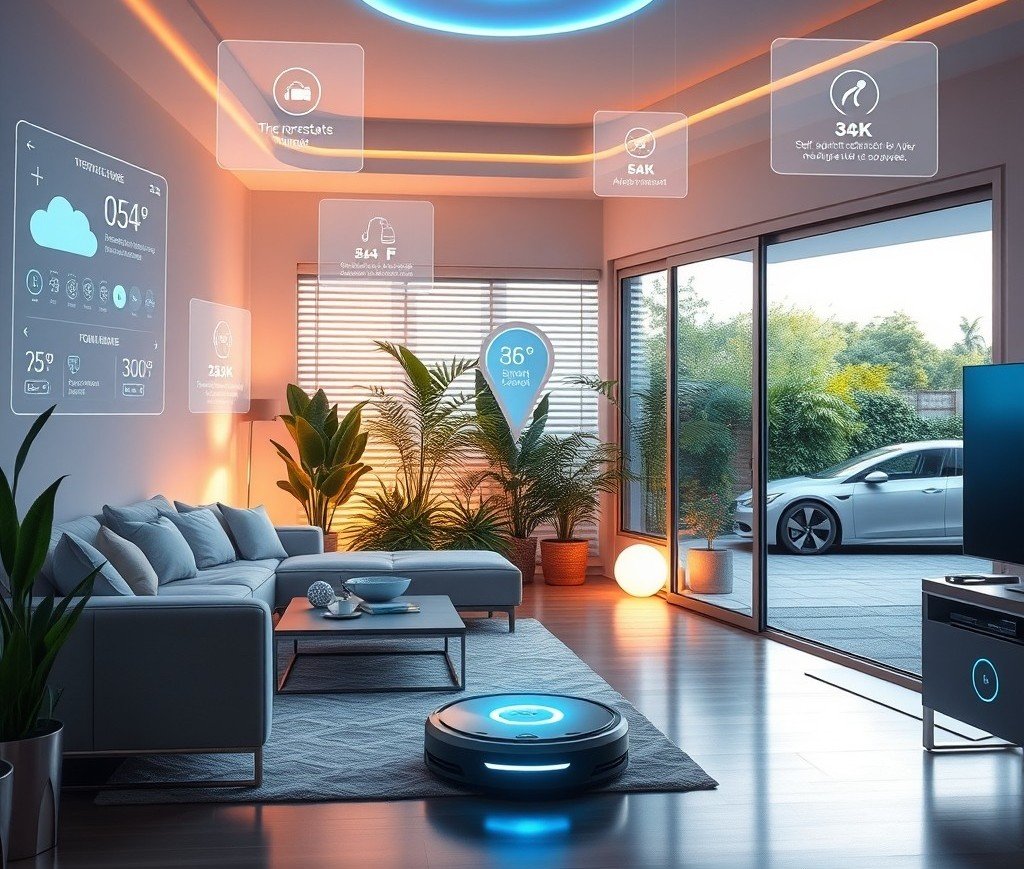
- Voice Assistance: AI-powered voice assistants like Amazon Alexa or Google Assistant control devices, set schedules, and provide information using natural language processing (NLP).
- Predictive Maintenance: AI algorithms monitor appliances and systems for potential failures, scheduling maintenance before issues arise, improving efficiency and longevity.
- Energy Management: AI analyzes usage patterns to optimize energy consumption, adjusting heating, cooling, and lighting based on occupancy and preferences to save energy.
- Security and Surveillance: AI-powered cameras and sensors detect anomalies, sending alerts and triggering responses such as activating alarms or notifying homeowners.
- Personalization: AI learns user habits and preferences over time, adjusting settings automatically (like preferred lighting or temperature) to enhance comfort and convenience.
Voice Assistance: Next generation assistants (e.g. Amazon Alexa, Google Assistant) will proactively manage household tasks. Learning user routines they will preheat ovens for favorite recipes when return home times approach or suggest grocery orders when pantry stocks run low (“AI Powered Home Devices: Smart Energy Management”).
https://www.ecoflow.com/us/blog/ai-powered-home-devices
Predictive Maintenance: Appliances embedded with vibration and temperature sensors analyzed by edge AI chips will predict component failures weeks in advance. An EcoFlow Wave 3 smart generator now alerts users to battery health issues via mobile notifications preventing untimely blackouts (“AI-Powered Home Devices: Smart Energy Management”).
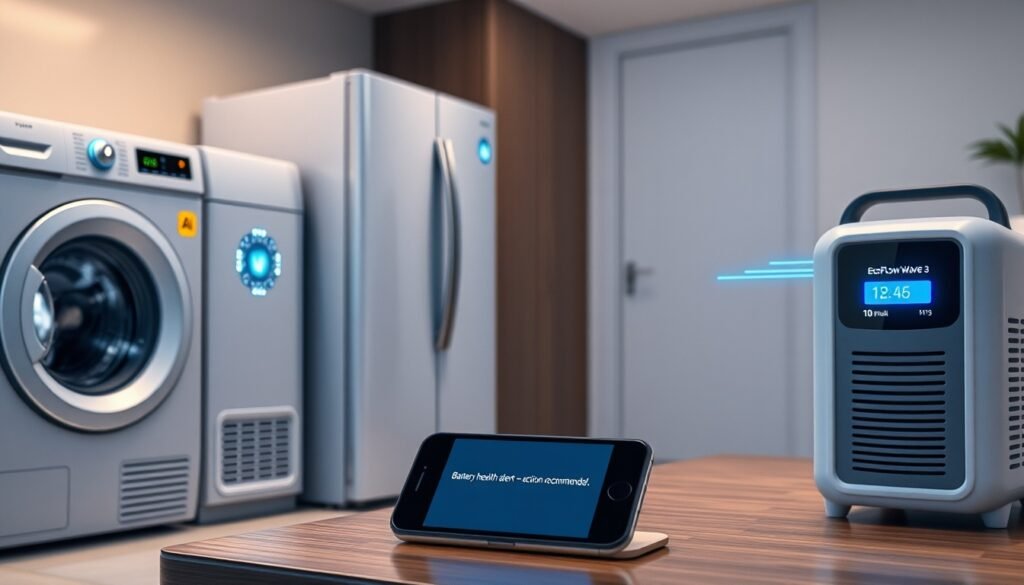
Energy Management: AI driven thermostats (e.g Ecobee SmartThermostat) combine occupancy prediction, weather forecasts and dynamic electricity tariffs to cut HVAC energy use by up to 23% (“AI in Smart Homes: 15 Revolutionary Automation Gadgets”).
https://digicrusader.com/the-future-of-smart-homes-15-ai-powered-home-automation-gadgets/
Security & Surveillance: AI enabled cameras (e.g. Google Nest Cam IQ) distinguish family members, pets and intruders sending contextual alerts (“AI in Smart Homes: 15 Revolutionary Automation Gadgets”).
Personalization: Adaptive lighting systems like Lutron Caséta now harvest daylight patterns and circadian rhythms to adjust illumination enhancing sleep quality while saving electricity (“AI in Smart Homes: 15 Revolutionary Automation Gadgets”).
Autonomous Vehicles and AI-Driven Transport
By 2030 self-driving cars and AI optimized traffic systems will revolutionize mobility reducing accidents and congestion.

Waymo’s robotaxis have already driven over 71 million miles without a safety driver demonstrating 88% fewer serious injury crashes than human drivers in operating cities (“Waymo Safety Impact”). A peer reviewed study found a 96% reduction in intersection crashes involving pedestrians and 85% fewer serious injury collisions compared to human benchmarks (“New Study: Waymo is reducing serious crashes”).
https://waymo.com/blog/2025/05/waymo-making-streets-safer-for-vru
On a macro scale cities like Los Angeles and Singapore employ AI driven adaptive traffic signals that analyze live camera feeds and sensor data to minimize delays. Los Angeles Automated Traffic Surveillance and Control system cut average travel times by 25% in pilot districts (“Top AI Startups Revolutionizing Traffic Management”).
https://www.tractiontechnology.com/blog/traction-five-how-ai-is-revolutionizing-traffic-management
Live Example:
Alphabet’s Waymo plans to expand driverless service to Washington, D.C and Miami by 2026 integrating AI with urban infrastructure to support Vision Zero goals (Time Magazine).
https://time.com/collections/time100-companies-2025/7289599/waymo/
AI Assistants as Daily Companions
By 2030 AI assistants will evolve into highly sophisticated context aware life managers that go far beyond simple task execution. They will seamlessly blend productivity tools with emotional intelligence allowing them to understand users’ needs, moods and environments to offer deeply personalized support.
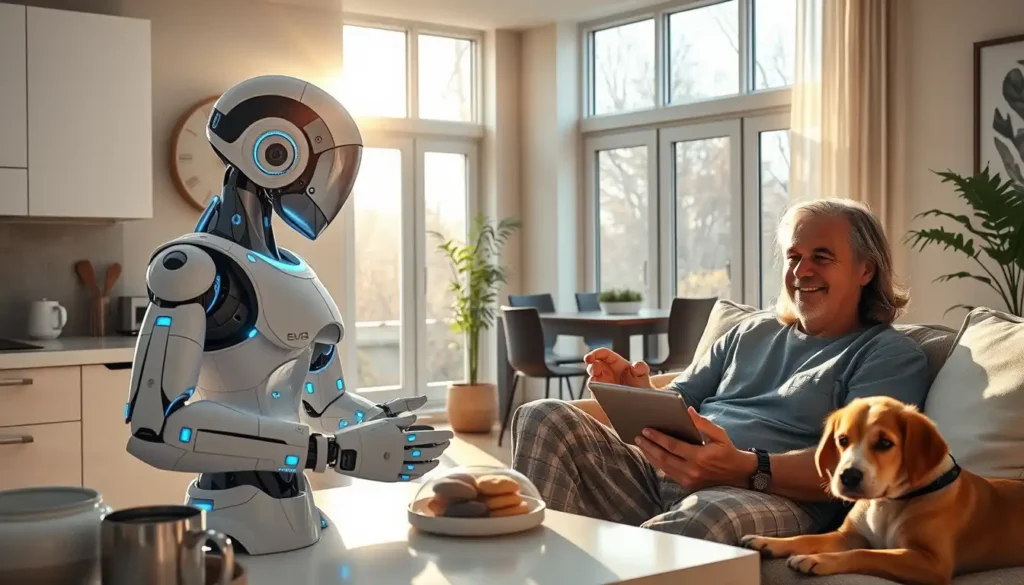
These assistants will proactively manage schedules provide timely reminders, handle communications and adapt to changing contexts by integrating real time data from multiple sources. Advanced multilingual capabilities and natural language understanding will enable fluid conversations across languages and cultural nuances.
Emotional intelligence integration will allow AI companions to recognize and respond empathetically to emotions offering encouragement or calming support as needed. Ultimately AI assistants will become indispensable daily partners that anticipate needs, facilitate decision making and enhance well being through personalized context-sensitive interactions.
Key market analyses expect the AI virtual assistant industry to grow substantially, driven by advances in natural language processing, deep learning, and integration into everyday devices, confirming its rising importance in personal and professional life.
Features of Future AI Assistants:
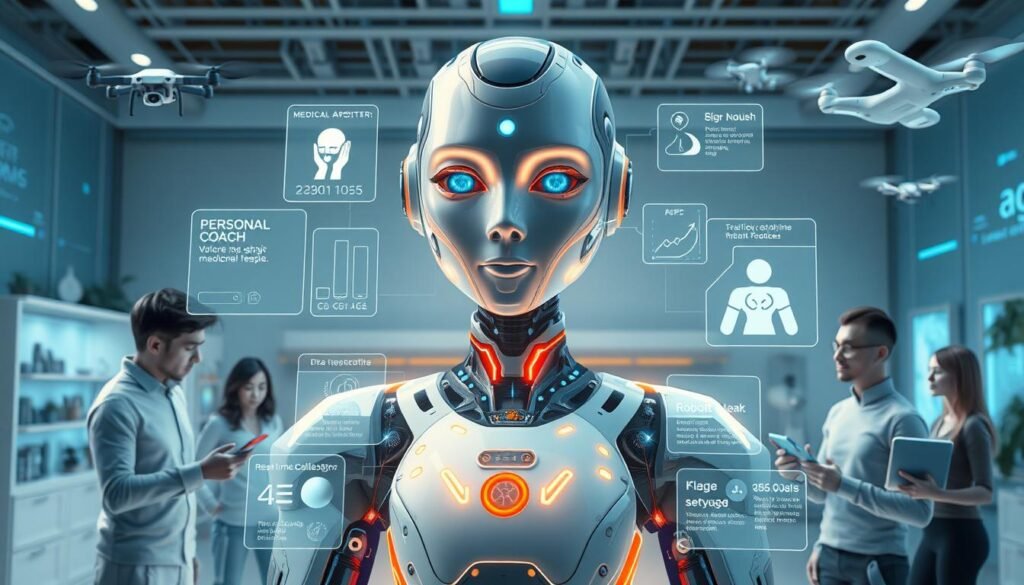
- Hyper-personalization: AI assistants will analyze calendars, emails, and health metrics to suggest scheduling optimizations reordering meetings when stress indicators surge or recommending meditation breaks.
- Multilingual & Multimodal Interaction: Transformers will enable seamless code switching and voice recognition across dozens of languages with real-time translation in video conferences.
- Emotional Intelligence: Sentiment analysis algorithms trained on massive voice and facial-expression datasets will detect emotional states and adjust interactions offering empathetic responses or motivational prompts.
Live Example:
Replika an AI chatbot launched in 2023 now supports emotional coaching by analyzing voice patterns by 2030 similar platforms will integrate deeply with users IoT devices to deliver contextually relevant support across daily activities.
The Future of Work with AI
Workplaces in 2030 will be AI-augmented automating routine tasks while enhancing strategic and creative roles.
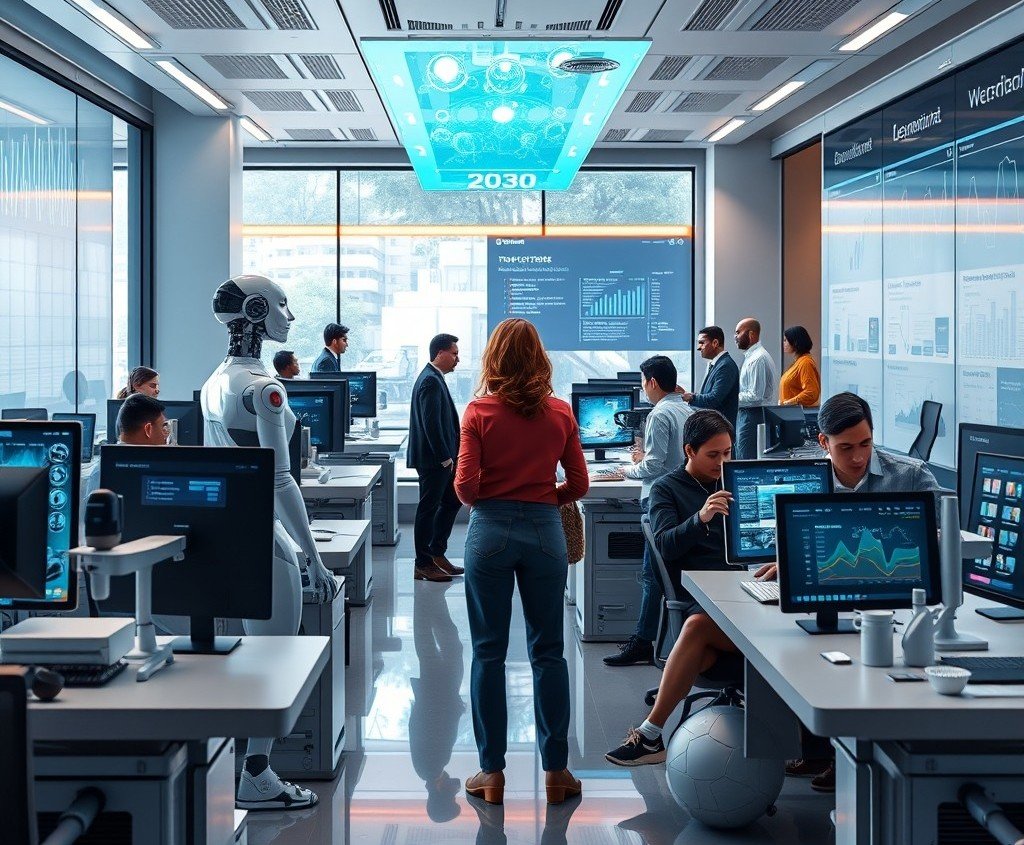
- AI recruitment tools analyzing candidate behavior
- Virtual AI coworkers handling emails, reports, and data
- AI-based project forecasting and risk analysis
- Upskilling employees through personalized learning algorithms
AI-Driven Hiring: Tools like HireVue’s AI assessments which analyze video interviews for verbal and nonverbal cues already accelerate candidate screening by 60% with 90% predictive validity of job performance.
Virtual AI Coworkers: AI agents will draft reports, summarize research and manage routine communications. IBM’s Watson Orchestrate now autonomously executes multi step workflows e.g. onboarding vendors and scheduling cross departmental meetings with human oversight.
Project Forecasting: Machine learning models will predict project timelines and budget risks with 85% accuracy drawing on historical data across thousands of projects.
Upskilling & Personalized Learning: Platforms like Coursera and LinkedIn Learning powered by recommendation engines will tailor learning paths to individual skill gaps and career goals boosting reskilling efficiency by 40%.
The Broader Impact on Society
AI’ s influence will extend far beyond healthcare, smart homes, autonomous vehicles, personal assistants and work by 2030 deeply transforming sectors such as education, finance, agriculture and entertainment. In education intelligent tutoring systems will adapt in real time to individual student needs personalizing learning and boosting outcomes by up to 30% through tailored instruction, immediate feedback and ongoing assessment.
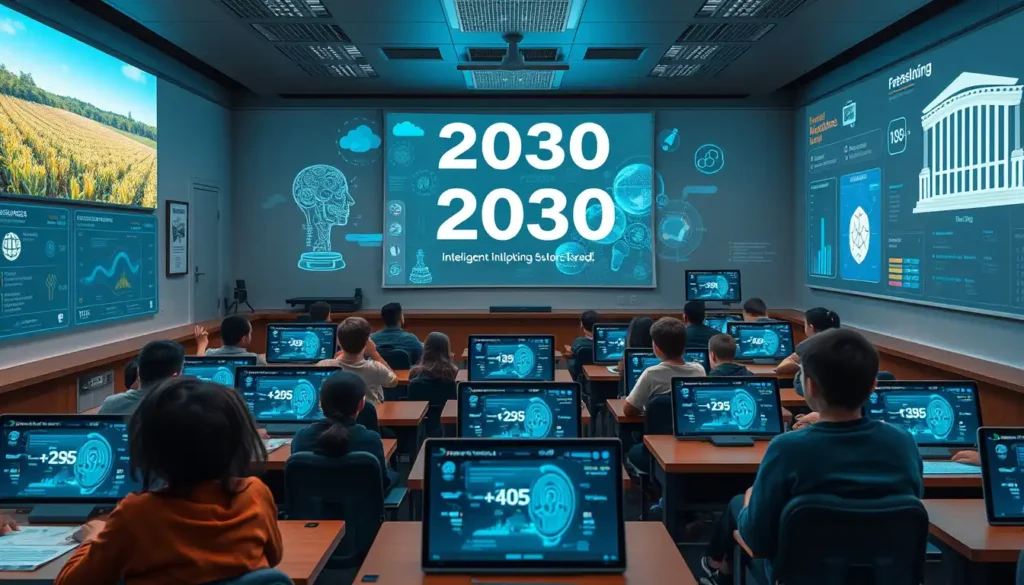
https://www.park.edu/blog/ai-in-education-the-rise-of-intelligent-tutoring-systems/
In finance AI powered fraud detection technologies will thwart roughly 95% of identity theft attempts by continuously analyzing transaction patterns and anomalies with advanced machine learning algorithms. Precision agriculture will benefit from AI driven drones and computer vision systems that monitor crop health, optimize irrigation and detect pests early ultimately increasing agricultural yields by around 20%. These advances illustrate AI’ s growing role in improving efficiency, safety and personalization across diverse fields fundamentally reshaping societal functions and quality of life.
Conclusion
AI is set to revolutionize everyday life by 2030 becoming an integral part of our daily routines rather than just a distant futuristic vision. From smart homes and autonomous vehicles to advanced healthcare systems and modern workplaces AI technologies will be seamlessly embedded in virtually every aspect of life. This integration will bring unprecedented convenience, efficiency and personalization, enhancing how we live, work and interact.
However as we move toward this AI driven future it is crucial to proactively address ethical considerations such as privacy, fairness, transparency and accountability. Balancing innovation with responsible governance will ensure that AI benefits society as a whole while minimizing potential risks. Embracing this transformative technology with careful planning and inclusive policies will pave the way for a safer, smarter and more connected world by 2030.
FAQs
What is the revolution of AI?
AI revolution refers to the rapid advancement and integration of artificial intelligence technologies across industries, transforming how we live and work.
What is the AI Revolution 2025?
The AI Revolution in 2025 signifies a pivotal moment where AI applications become more ubiquitous, impacting everything from healthcare to transportation.
Who started the AI revolution?
The AI revolution has been driven by numerous pioneers and organizations globally, including research institutions, tech giants like Google and IBM, and visionary entrepreneurs.
How will AI revolutionize the world?
AI will revolutionize the world by enhancing productivity, automating tasks, improving healthcare diagnostics, and enabling smarter decision-making across sectors.
Will AI replace humans?
AI is unlikely to replace humans entirely but will augment human capabilities, potentially reshaping job roles and requiring new skills for the workforce.
Is AI good or bad for society?
AI’s impact on society is nuanced; while it offers tremendous benefits like efficiency and innovation, concerns remain about job displacement and ethical implications that need careful consideration.


